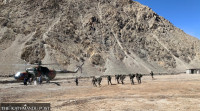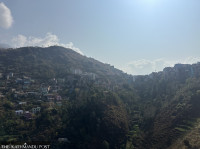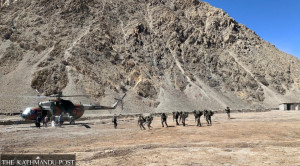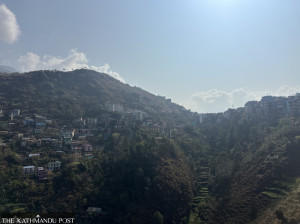Karnali Province
Mugu farmers face difficulties to sell apples this year due to bad road conditions
Regular landslides and mudslides mean vehicles rarely use the only road that connects the district with the rest of the country.
Raj Bahadur Shahi
This year’s monsoon rains severely damaged the 94-km long Gamgadhi-Nagma road stretch in Mugu, along the Karnali Highway, rendering the only road that connects the district with the rest of the country impassable. Farmers in the district who rely on the road to transport their produce, mostly apples, to trade hubs like Nepalgunj and Surkhet faced bleak circumstances.
Mugu’s apples are in high demand for their crunch and sweetness. They are usually sold for Rs70 to Rs75 per kilogram in the markets in Surkhet and Nepalgunj. During the harvest season, an apple farmer expects to make at least Rs600,000.
But this season, most of their produce did not make it to the markets.
Hari Rokaya, a farmer from Talcha in Chhayanath Rara Municipality, for instance, harvested around 40 quintals of apples this year. His apple orchard grows Golden and Delicious species—the firm, crisp and white-fleshed sweet apples. He remembers selling up to 30 quintals of apples and making about Rs400,000 profit last season. This year, however, he watched his apples ripen and then rot on the branches.
“We face difficulties transporting our apples to the city areas every year, but this year was exceptionally hard,” Rokaya told the Post. “If I sell the apples in Mugu, I get only Rs10 per kg. So instead of putting in the labour to pick apples, sort them out and take them to the local market, I’d rather let it rot in the trees.”
In Mugu, apples are commercially grown in Chhayanath Rara Municipality, Soru, Khatyad and Mugam Karmarong rural municipalities, their altitude being favourable for apple cultivation. Altitude ranging from 2,600 metres to 3,500 metres are suitable for farming apples, particularly the Golden, Delicious and Fuji varieties, according to agriculturists.
The farmers could transport apples to the Tarai via air, but the transport fare is too high. If the transportation cost for one kilogram of apples via road is Rs 7 per kg, the cost reaches up to Rs 65 per kilogram if transported via air, according to Banche Mahatara, a farmer from Talcha village.
The cumulative yield of apples in Mugu stands at 28 to 35 metric tonnes per year. Among them, 15 metric tonnes of apples are consumed within the district; the rest is brought down to the markets in the Tarai. The data provided by the Agriculture Knowledge Centre shows that around 15 metric tonnes of apples in the district are wasted every year. “There is wastage of apples every year, but this year the waste could be higher,” said Sukiram Nepali, chief at the Agriculture Knowledge Centre. “Most farmers in Mugu could not take their produce to the markets, and there’s only so much demand here in the local markets.”
According to Nandalal Baduwal, ward chairman of Chhayanath Rara Municipality Ward No. 14, farmers in the region have been growing apples for the past four decades now. “They have been growing apples for so long. The soil in this region is rich and fertile for apples, and the farmers haven’t experimented with any other food crops,” Baduwal said. “If they could grow a variety of produce, then maybe the local market would absorb them.”
Markets in Mugu are not large enough to absorb every apple grown in the region, said Baduwal. “The major problem for apple farmers is a lack of accessible market,” he added. “They have to ferry their produce to the Tarai, which is okay until the roads give way like this year.”
The Gamgadhi-Nagma dirt road turns to muddy slush every monsoon. This year was no different, and to make matter worse, multiple landslides on the stretch made transportation of goods and people impossible. The road section is yet to see repairs and the apple farmers in Mugu are caught in a catch-22 situation.
“This year, I grew apples worth around Rs 800,000,” Karna Bham, a farmer from Talcha, said. “I could not take them down to either Surkhet or Nepalgunj since the road is in such a bad condition.”
Seven years ago, when the Nepal Army handed over the Gamgadhi-Nagma road section to the provincial government after its completion, Mugu locals were hopeful. But the road soon fell into disrepair due to the lack of upgradation work after the handover.
The road stretch remains unmotorable for two months in a year, during monsoon and winter, say locals.
The federal government has allocated Rs 500 million to upgrade Gamgadhi-Nagma road section in the current fiscal year, keeping in view the plight of Mugu locals, especially farmers who depend on apple farming to see them through the year, according to Shrawan Kumar Mahatara, an engineer at the Division Road Office. “Various road infrastructures including retaining walls, roadside drains, bridges and culverts will be constructed this year,” said Mahatara. “The blacktopping of the road, however, will only start from the next fiscal year.”
For Rokaya, the farmer from Talcha, the allocation of budget is not news, nor is it something he’s excited about. “The government pledges a certain budget for road upgradation every year, but the condition of the road remains the same,” he said. “If this continues, I might as well move away from apple farming eventually. But then what else will I do?”
As for this year’s yield, Rokaya said he has been figuring out the recipe for jams and pickles and is looking for ways to salvage the apples and make some money.




 9.83°C Kathmandu
9.83°C Kathmandu.jpg)













